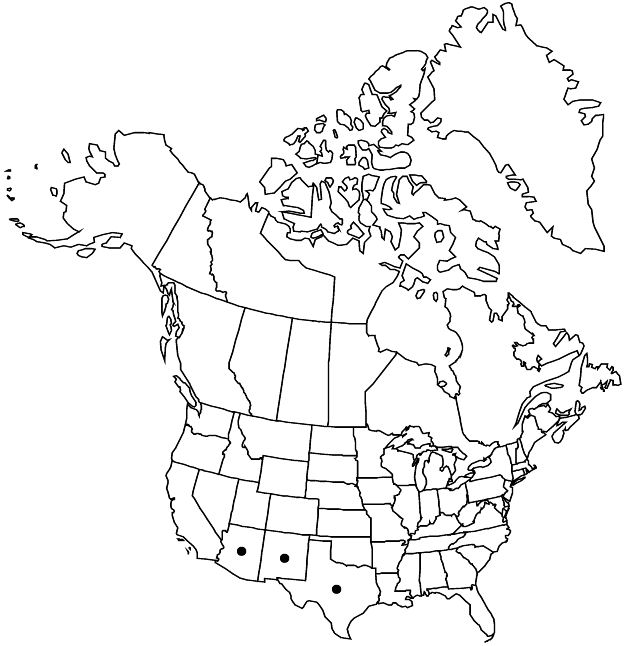Difference between revisions of "Phoradendron villosum subsp. coryae"
Brittonia 16: 45. 1964.
FNA>Volume Importer |
imported>Volume Importer |
||
| (4 intermediate revisions by 2 users not shown) | |||
| Line 10: | Line 10: | ||
|name=Phoradendron coryae | |name=Phoradendron coryae | ||
|authority=Trelease | |authority=Trelease | ||
| + | |rank=species | ||
|publication_title=Phoradendron, | |publication_title=Phoradendron, | ||
|publication_place=43, plate 44. 1916 | |publication_place=43, plate 44. 1916 | ||
| Line 16: | Line 17: | ||
|name=P. villosum var. coryae | |name=P. villosum var. coryae | ||
|authority=(Trelease) B. L. Turner | |authority=(Trelease) B. L. Turner | ||
| + | |rank=variety | ||
}} | }} | ||
|hierarchy=Viscaceae;Phoradendron;Phoradendron villosum;Phoradendron villosum subsp. coryae | |hierarchy=Viscaceae;Phoradendron;Phoradendron villosum;Phoradendron villosum subsp. coryae | ||
| Line 31: | Line 33: | ||
|elevation=400–2400 m. | |elevation=400–2400 m. | ||
|distribution=Ariz.;N.Mex.;Tex.;Mexico (Chihuahua;Coahuila;Sonora). | |distribution=Ariz.;N.Mex.;Tex.;Mexico (Chihuahua;Coahuila;Sonora). | ||
| − | |discussion=<p>In the flora area, < | + | |discussion=<p>In the flora area, <i></i>subsp.<i> coryae</i> is found in Arizona south of the Mogollon Rim, through central New Mexico to the Chisos and Davis mountains of western Texas. Its principal hosts are <i>Quercus</i> species.</p><!-- |
| − | --><p>The molecular study by V. E. T. M. Ashworth (2000b) showed that <i>Phoradendron villosum</i> is paraphyletic because P. scaberrimum Trelease forms a clade with < | + | --><p>The molecular study by V. E. T. M. Ashworth (2000b) showed that <i>Phoradendron villosum</i> is paraphyletic because P. scaberrimum Trelease forms a clade with <i></i>subsp.<i> coryae</i>. All three of these taxa parasitize <i>Quercus</i> and a shared indel supported their phylogenetic relationship.</p> |
|tables= | |tables= | ||
|references= | |references= | ||
| Line 41: | Line 43: | ||
-->{{#Taxon: | -->{{#Taxon: | ||
name=Phoradendron villosum subsp. coryae | name=Phoradendron villosum subsp. coryae | ||
| − | |||
|authority=(Trelease) Wiens | |authority=(Trelease) Wiens | ||
|rank=subspecies | |rank=subspecies | ||
| Line 56: | Line 57: | ||
|publication year=1964 | |publication year=1964 | ||
|special status= | |special status= | ||
| − | |source xml=https:// | + | |source xml=https://bitbucket.org/aafc-mbb/fna-data-curation/src/2e0870ddd59836b60bcf96646a41e87ea5a5943a/coarse_grained_fna_xml/V12/V12_878.xml |
|genus=Phoradendron | |genus=Phoradendron | ||
|species=Phoradendron villosum | |species=Phoradendron villosum | ||
Latest revision as of 19:18, 5 November 2020
Hairs on young stems, leaf blades, and inflorescences of two types, some in dense clusters, relatively longer, others uniformly distributed, relatively shorter. Staminate inflorescences: internodes each (14–)25(–44)-flowered. Pistillate inflorescences: internodes each (6–)8(–12)-flowered.
Phenology: Flowering Jul–Sep.
Habitat: Oak woodlands.
Elevation: 400–2400 m.
Distribution

Ariz., N.Mex., Tex., Mexico (Chihuahua, Coahuila, Sonora).
Discussion
In the flora area, subsp. coryae is found in Arizona south of the Mogollon Rim, through central New Mexico to the Chisos and Davis mountains of western Texas. Its principal hosts are Quercus species.
The molecular study by V. E. T. M. Ashworth (2000b) showed that Phoradendron villosum is paraphyletic because P. scaberrimum Trelease forms a clade with subsp. coryae. All three of these taxa parasitize Quercus and a shared indel supported their phylogenetic relationship.
Selected References
None.